"When we decided to start growing proteas commercially, everyone thought we were crazy. Proteas don't grow in Colombia, they said. But they do, and we can supply them 52 weeks a year", says Eli Perez, General Manager at Rosamina. Currently, they are a 50 ha protea and foliage farm, with 40 ha in production. They are also making bouquets and arrangements with third-party flowers, sending them worldwide. This article will be more about the farm, the challenges, and their future plans.
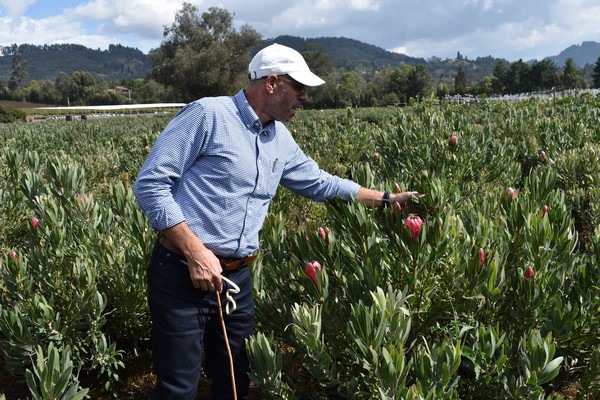
Eli Perez.
From roses to proteas
The Perez family has been in the floral business for 33 years already. Eli's father used to grow roses and always had a passion for proteas. He started growing the first plants 20 years ago. In 2016, they sold the rose greenhouse and acquired land to start growing proteas and foliage. However, as it is a new crop, a lot had to be learned, and a lot of trials had to be done and are still being done. The climatological conditions in Colombia are different than in South Africa, where they are native. Therefore, they had to trial different varieties and different ways of growing them. "And we are still learning and trialing. For example, 2 to 3 years ago, we started to grow several of the proteas in a bag instead of in the soil. Why? We do not have to depend on the quality of the soil, if it rains a lot, not all fertilizers will be flushed away, and it is easier to change a plant." Currently, about half of the protea crop is grown hydroponically. Why not the entire crop? "We are very pleased with the results so far, but we do not know the long-term effect on the plant when growing it in a bag. That's why we remain a bit cautious."
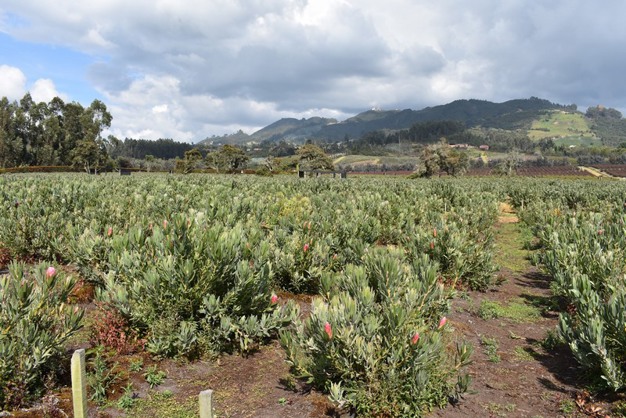 Proteas in the field, in the soil.
Proteas in the field, in the soil.
"We are different"
"My uncle once said you need to be first, last, or different. And different, we definitely are. First of all, we have a different flower compared to many other farms in the country or in Latin America. Secondly, we can grow proteas 52 weeks a year. And last but not least, we also grow Leucospermum and Leucadendron, which are also quite different crops. We are continuously trialing with new protea varieties, like we started producing King protea two years ago, and other varieties. As long as they are different, we like to start producing it."
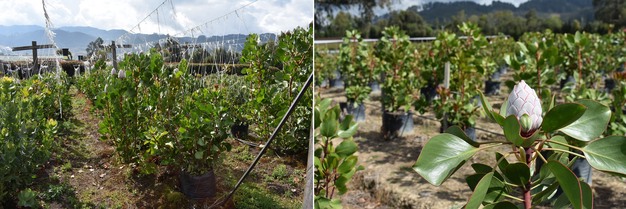
In both pictures, King proteas. However, they grow or trial them in different ways. In the picture, both are in bags, but on the left with wires. Click here to enlarge the picture.
Weather is the main challenge
According to Perez, the main challenge to produce proteas is the weather. "We do not have a greenhouse, and in Colombia, we have a lot of rain. Last year, about 20 percent of the farm died due to access to rains. And for the proteas production, it is an immense impact as it takes 3 years for a flower to bloom and 2 years to rebloom." But Perez is more worried about the frosts. "Frosts are terrible. During Covid, we lost 50% of the farm to frost. It took 2 years to get the proteas back.".

Clockwise, Weather station, Tingua, a critically endangered species enjoying the fresh recycled water at Rosamina, new native varieties are being planted as 15% of the farm needs to consist of native plants for the Rainforest Alliance certificate, like the Alcaparro (bottom left).
People and environment
Besides the crop, the social and environmental aspects are a crucial part of their business. They, for example, harvest rainwater, are increasing their use of biocontrols, are Rainforest Alliance certified, and are planning to install solar panels to become self-sufficient in energy use. On the social level, their employees are part of the family and are encouraged and financially supported to go to college. "In the past, we had buses picking up our colleagues, now we have to expand our parking lot for their cars", Eli Perez proudly says.
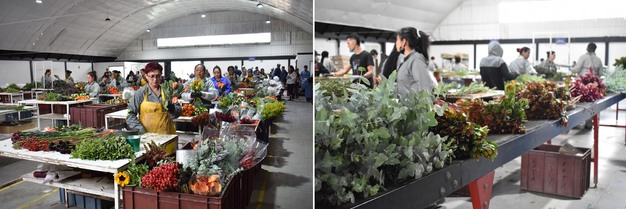
Post-harvest area, where they make the bouquets and arrangements. Click here to enlarge the image.
Increase in demand
The demand for Rosamina's proteas is rising, and according to Perez, this has several reasons. "The popularity of the flower has been increasing for several years. People are noticing the beauty and benefits of this plant. It, for example, has a vase life of 3 weeks and changes every day. In order to keep and gain new customers, quality control is very strict. Another reason for the increase in demand is that the production of proteas worldwide is decreasing because there are no successors for the businesses." Rosamina's proteas are sold worldwide under the brand name Global Proteas. In North America, Splendor is their distributor.
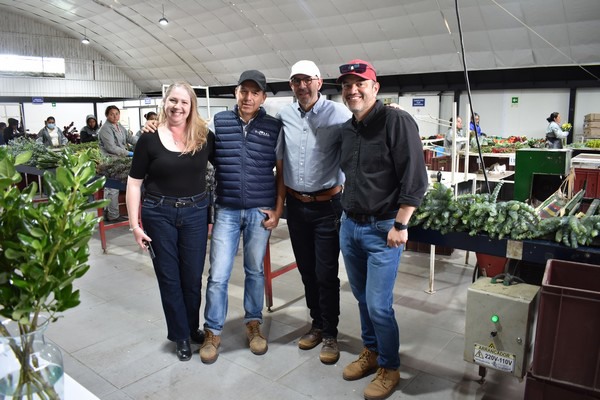
Elisabeth Zambrana ,Designer and Sales Director, Pacho Franciscus, Farm Managers, Eli Perez, General Manager and Arvadio Martinez, Rosamina Manager.
Expansion plans
In the coming years, Rosamina will grow not only in size but also in varieties. Currently, 50% of the area is planted with new varieties, which will be in production by the end of the year. Also, they are planning to add another 30 ha to the farm.
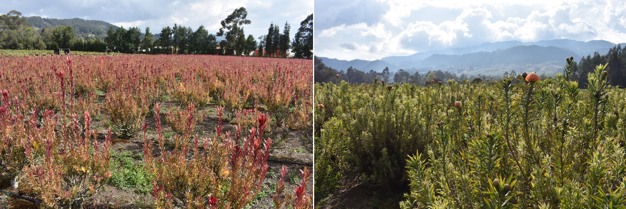
Leucadendron and Leucospermum in the field. Click here to enlarge the image.
![]() For more information:
For more information:
Rosamina
rosamina.com
